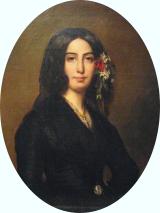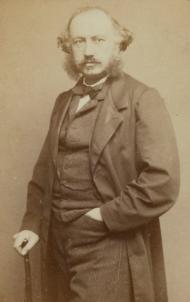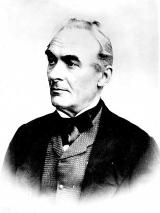Who dated George Sand?
Félicien Mallefille dated George Sand from ? until ?. The age gap was 8 years, 10 months and 2 days.
Victor Borie dated George Sand from ? until ?. The age gap was 14 years, 2 months and 10 days.
Alfred de Musset dated George Sand from ? until ?. The age gap was 6 years, 5 months and 10 days.
Alexandre Manceau dated George Sand from ? until ?. The age gap was 12 years, 10 months and 2 days.
Prosper Mérimée dated George Sand from ? until ?. The age gap was 0 years, 9 months and 3 days.
Jules Sandeau dated George Sand from ? until ?. The age gap was 6 years, 7 months and 18 days.
Michel de Bourges dated George Sand from until . The age gap was 6 years, 8 months and 1 days.
Frédéric Chopin dated George Sand from until . The age gap was 5 years, 8 months and 0 days.
George Sand

Amantine Lucile Aurore Dupin de Francueil (French: [amɑ̃tin lysil oʁɔʁ dypɛ̃]; 1 July 1804 – 8 June 1876), best known by her pen name George Sand (French: [ʒɔʁʒ(ə) sɑ̃d]), was a French novelist, memoirist and journalist. Being more renowned than either Victor Hugo or Honoré de Balzac in Britain in the 1830s and 1840s, Sand is recognised as one of the most notable writers of the European Romantic era. She has more than 50 volumes of various works to her credit, including tales, plays and political texts, alongside her 70 novels.
Like her great-grandmother, Louise Dupin, whom she admired, George Sand advocated for women's rights and passion, criticized the institution of marriage, and fought against the prejudices of a conservative society. She was considered scandalous because of her turbulent love life, her adoption of masculine clothing, and her masculine pseudonym.
Read more...Félicien Mallefille

Jean Pierre Félicien Mallefille (May 3, 1813 – November 24, 1868) was a French novelist and playwright.
Mallefille was born in Mauritius. He wrote a number of plays, including Glenarvon (1835), Les sept enfants de Lara (1836), Le cœur et la dot (1852), and Les sceptiques (1867), as well as two comedies, and two novels, Le collier (1845) and La confession du Gaucho (1868). A farce of his, Les deux veuves, later formed the basis of the libretto for Bedřich Smetana's opera The Two Widows.
He also wrote a scenario in French that was to have been the basis of a libretto for the opera Sardanapalo by Franz Liszt, but delivered it so late that Liszt, angered at his unreliability, had commissioned an Italian libretto from another writer; in the end the opera was never completed.
Mallefille also had a relationship with George Sand.
Read more...George Sand

Victor Borie

Victor Borie, né le à Tulle et mort le à Paris 6e, est un journaliste français.
Read more...George Sand

Alfred de Musset

لوي شارل ألفرد دي موسيه -باتاي (بالفرنسية: Louis Charles Alfred de Musset-Pathay) (وُلد في 11 ديسمبر 1810 وتوفي في 2 مايو 1857) شاعر فرنسي ومسرحي وروائي. يُعرف بشعره كما يُعرف بكتابه: اعترافات طفل من القرن (La Confession d'un enfant du siècle)، وهو سيرة ذاتية له.
Read more...George Sand

Alexandre Manceau

Alexandre Manceau, né à Trappes le et mort à Palaiseau le , est un graveur et auteur dramatique français.
Read more...George Sand

Prosper Mérimée

Prosper Mérimée (París, 28 de septiembre de 1803-Cannes, 23 de septiembre de 1870) fue un escritor, historiador y arqueólogo francés. Es autor de la novela corta Carmen, que sería inmortalizada en la famosa ópera homónima de Georges Bizet.
Read more...George Sand

Jules Sandeau

Léonard Sylvain Julien (Jules) Sandeau (French: [sɑ̃do]; 19 February 1811 – 24 April 1883) was a French novelist.
Read more...George Sand

Michel de Bourges

Louis-Chrysostome Michel, dit Michel de Bourges, né à Pourrières (Var) en 1797 et mort à Montpellier en 1853, est un avocat et homme politique français.
Read more...George Sand

Frédéric Chopin

Frédéric François Chopin (born Fryderyk Franciszek Chopin; 1 March 1810 – 17 October 1849) was a Polish composer and virtuoso pianist of the Romantic period who wrote primarily for solo piano. He has maintained worldwide renown as a leading composer of his era whose "poetic genius was based on a professional technique that was without equal in his generation".
Chopin was born in Żelazowa Wola and grew up in Warsaw, which in 1815 became part of Congress Poland. A child prodigy, he completed his musical education and composed his early works in Warsaw before leaving Poland at age 20, less than a month before the outbreak of the November 1830 Uprising; at 21, he settled in Paris. Thereafter he gave only 30 public performances, preferring the more intimate atmosphere of the salon. He supported himself, selling his compositions and giving piano lessons, for which he was in high demand. Chopin formed a friendship with Franz Liszt and was admired by many musical contemporaries, including Robert Schumann. After a failed engagement to Maria Wodzińska from 1836 to 1837, he maintained an often troubled relationship with the French writer Aurore Dupin (known by her pen name George Sand). A brief and unhappy visit to Mallorca with Sand in 1838–39 proved one of his most productive periods of composition. In his final years he was supported financially by his admirer Jane Stirling. In poor health most of his life, Chopin died in Paris in 1849 at age 39.
All of Chopin's compositions feature the piano. Most are for solo piano, though he also wrote two piano concertos before leaving Warsaw, some chamber music, and 19 songs set to Polish lyrics. His piano pieces are technically demanding and expanded the limits of the instrument; his own performances were noted for their nuance and sensitivity. Chopin's major piano works include mazurkas, waltzes, nocturnes, polonaises, the instrumental ballade (which Chopin created as an instrumental genre), études, impromptus, scherzi, preludes, and sonatas, some published only posthumously. Among the influences on his style of composition were Polish folk music, the classical tradition of Mozart and Schubert, and the atmosphere of the Paris salons, of which he was a frequent guest. His innovations in style, harmony, and musical form, and his association of music with nationalism, were influential throughout and after the late Romantic period.
Chopin's music, his status as one of music's earliest celebrities, his indirect association with political insurrection, his high-profile love life, and his early death have made him a leading symbol of the Romantic era. His works remain popular, and he has been the subject of numerous films and biographies of varying historical fidelity. Among his many memorials is the Fryderyk Chopin Institute, which was created by the Polish parliament to research and promote his life and works, and which hosts the prestigious International Chopin Piano Competition, devoted entirely to his works.
Read more...